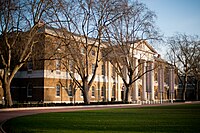
Photo from wikipedia
Abstract Research into how and what families learn in science museums and other informal science learning settings suggests that parent-child interactions play an important role in shaping children’s learning experiences.… Click to show full abstract
Abstract Research into how and what families learn in science museums and other informal science learning settings suggests that parent-child interactions play an important role in shaping children’s learning experiences. Our exploratory case study set out to discover and analyse learning happening within family groups during a visit to a traditional museum natural history gallery. Research methods were influenced by a growing body of literature that looks for learning in family visitor talk. Conversations of 18 families were recorded as they explored a gallery after being introduced to six learning games which fostered a ‘climate of inquiry’ and which were designed to spark family dialogue. Our findings indicate that families adopt a range of interactional approaches for building meaning together in a museum gallery. These approaches fell along a spectrum that varied according to the level of co-investigation and co-operation between group members. We suggest that family learning could be supported in informal learning contexts through simple, low-cost learning strategies that encourage dialogue and co-investigatory behaviours.
Journal Title: Journal of Biological Education
Year Published: 2018
Link to full text (if available)
Share on Social Media: Sign Up to like & get
recommendations!